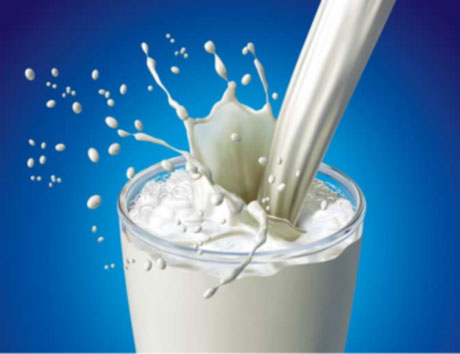
There are very good reasons for thinking that breast-milk is the best food for a baby during the first few months of his life. Each animal has its own special milk, evolved over many centuries to provide food for that particular baby animal. This milk differs widely from one species to another. You can immediately see the difference between human milk and cow's milk. Human milk looks rather watery compared to that in the bottle left by the milkman. It is wrong to think that your own milk is not good enough for a newborn baby because it does not look as rich as cow's milk. On the contrary, it is easier for the baby's immature stomach to digest and is more nutritious.
Cow's milk contains a lot of protein, but much of it is curd which will clot in the baby's stomach. The protein in human milk is much finer and more easily digestible. As you will notice from many bottles of milk, the amount of fat in cow's milk varies a great deal. It is for this reason that some cow's milk is partially skimmed to give 'half-cream' milk. The amount of lactose or milk-sugar is about the same in both milks, but the minerals are very different. Cow's milk contains a lot more sodium, usually present as common salt, and this may cause many problems if the baby is feverish or has diarrhoea. There is also a lot of phosphorous in cow's milk; this may lower the amount of calcium in the blood and can sometimes cause convulsions in the newborn baby.
There are several substances in breast-milk which are of major importance to a baby because they counteract infection. There are anti-bodies and other compounds in the milk which appear to stop germs from entering the baby's body through the gut giving him built-in immunity to a number of dangerous diseases. An illustration of this is that breast-feeding will prevent polio vaccination from taking effect when it is given by mouth. You will have to stop breast-feeding for a day or two at the time polio vaccination is given, otherwise the virus in the vaccine will not be taken up the baby and he will not produce resistance.
Very occasionally, babies die during the first year of life and many of these deaths occur quite tragically and suddenly. These deaths are less frequent in breast-fed babies than in those have been bottle-fed. We do not yet know the cause of these tragedies, but it is likely that many of them are due to sudden infection which may be prevented by breast-feeding.
You will see that in breast-feeding there are many advantages for the baby: the milk contains all the necessary foods in the right proportions and in easily digestible forms, there is less salt and other minerals in the milk, and it will help to prevent an infection early in life.

